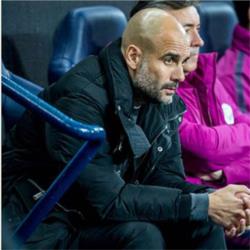
Pep Guardiola has always been something of an enigma, a character so mysterious and inscrutable that it was hard to place what made him so successful. However, the recent documentary series ‘All or Nothing: Manchester City’ has shone a light on the methods employed by Guardiola at his current club, making clear some of the reasons why he has achieved so much at the top of the game.
The documentary features numerous clips of Guardiola’s impassioned speeches. His eyes are wild and fiery, his feet shuffle around the floor, unable to be still, his hands gesticulate wildly as his dulcet Spanish tones are punctuated with curses. His intensity bleeds out of the screen and into the living room, causing the viewer to almost nod their head in subordination.
This is the intensity of a man who has only managed at the highest level. When your first managerial job is at Barcelona, there’s a long way to fall. And yet Guardiola has maintained an almost unhealthy level of success and looks set to increase that this season, if you agree with Paddy Power football betting. Three successive league titles and two Champions League titles at Barcelona among other honours, three successive league titles at Bayern Munich and now the first of what could be many Premier League crowns at Manchester City.
So how has he done it? There’s an opinion among Pep’s would-be doubters that the Spaniard has benefitted from being thrust into one of Europe’s top clubs who, at the time, had one of the best teams football had ever seen. Lionel Messi was just entering his prime, Xavi and Andres Iniesta were pulling the strings in midfield, and Carles Puyol and Gerard Pique were two rocks at the heart of the defence.
But it would be churlish to suggest that that Barcelona side was destined for their incredible success irrespective of who held the reins at the club. Guardiola introduced a style of play that was both flamboyantly expansive, while at the same time grinding down the will of opposition. This was a step above the Spanish national side’s ‘death by passing’ tactics, there was a much greater purpose to it in an attacking sense, fully utilising the passing capabilities of Xavi and Iniesta, and giving Messi the freedom to express his talents.
The success of Guardiola also lies in the fact that he has been able to adapt his style and tactics for the different clubs he has managed. His Bayern Munich side were more direct — his playing personnel demanded this. Lewandowski, a classic centre forward in many respects, required a different type of service than the likes of Messi and Pedro did at Barcelona. Arjen Robben and Franck Ribery were wingers in a much more traditional sense, but Guardiola still fostered a style of play that brought the best out of everyone, even if a Champions League title did prove elusive.
The first season at Manchester City was something of a defining moment for Guardiola. It was the first season as a manager where he failed to deliver a trophy, the first season that could objectively be described as an under-achievement. City were often toothless in attack and leaky at the back — a far cry from the dominance of past Pep sides.
But even then the seeds were being sown for what would become arguably the most impressive performance by any team in a Premier League season in the following campaign. City were utterly spellbinding in 2017/18, tearing teams apart at will through the incisive laser-like passing of Kevin de Bruyne, and the ruthless, clinical finishing of Sergio Aguero and Gabriel Jesus. Guardiola masterminded a record-breaking campaign, which saw city score over 100 goals, win 100 points and, at one point, enjoy a run of 18 consecutive wins.
City’s ruthless dominance perhaps stems from Guardiola’s tendency to favour a very fluid, attack-minded defence. Kyle Walker and Benjamin Mendy were purchased more for their attacking capabilities than their defensive qualities and this shone through last season. Having such attacking full-backs causes problems for any opposition as it drags the team out of their preferred defensive shape and this is something City exploited to full effect last season.
But aside from Guardiola’s tactical shrewdness, he is a man-manager like no other. There is a frenzied, almost panicked desire to see his players become the best they can be. This manic nature rubs off on his players, as if they feel obliged to match the intensity shown by their manager on the pitch. The documentary showcases an outstanding team spirit in the Manchester City dressing room and this is testament to the work of Guardiola and his staff.
It’s easy to forget that Guardiola is still only 47 years old, that he still has another 20 years at least in the game ahead of him. The future stretches out endlessly for the Spaniard and, given the way he has brought success to these three different clubs, who’s to say his dominance can’t go on and on?